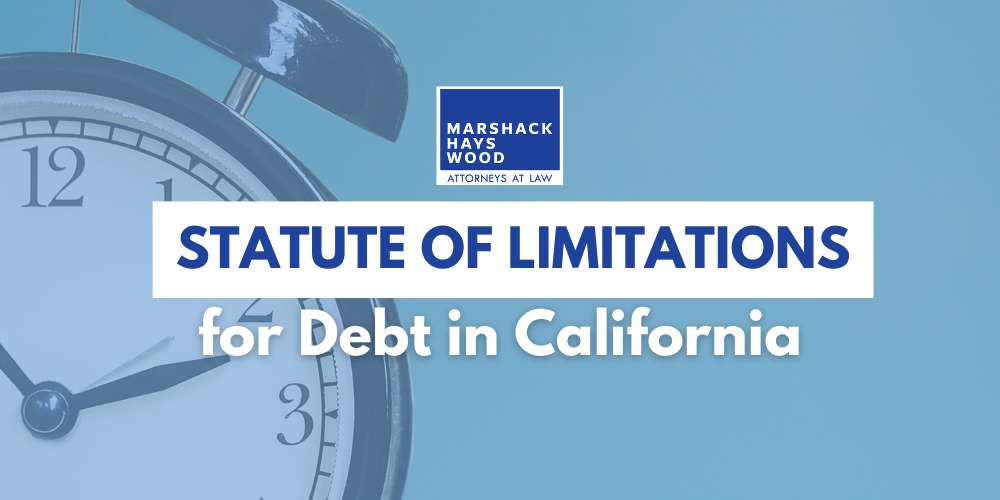Debt can be a major source of stress and financial instability, and debt collection agencies will often turn to less-than-savory tactics to try and collect on their debt. However, there are certain legal barriers that can prevent them from collecting debt, like the debt’s statute of limitations. California debt collectors can only collect on debts that are within the statute of limitations to collect.
The skilled Orange County bankruptcy attorneys at Marshack Hays Wood specialize in assisting clients in Orange County and beyond in understanding and navigating the statute of limitations on their debt. Whether you’re facing challenges with credit card debt, medical bills, or other financial obligations, our experienced attorneys are here to provide comprehensive and personalized solutions.
Call us at (949) 333-7777 to schedule a free consultation with a member of our legal team to learn more about how we can help.
Does Debt Collection Have a Statute of Limitations?
Many legal proceedings have what is called a “statute of limitations,” which is a limited amount of time in which someone can file legal action against someone. Debt also has a statute of limitations, meaning that there’s a time limit on how long creditors are allowed to legally pursue unpaid debts through the court system. After the limitations period is up, debt collectors cannot take legal action against the debtor in court regarding that specific debt.
Different types of debt have different statutes of limitations, and different states have different time limits on these debts. For example, California will have different limitations on credit card debts than other states. It’s essential for individuals to be aware of these timelines in their state in order to protect their rights.

What is the California Statute of Limitations on Debt?
For most debts, California’s statute of limitations is four years from the date of the debtor’s last payment, as outlined in California Code of Civil Procedure § 337. However, certain debts have different time limits in place. Below are the statutes of limitations on various debts per California state law.
- Credit card debt: 4 years
- Medical debt: 4 years
- Auto loans: 4 years
- Federal student loans: 4 years
- Mortgage debt: 6 years
- Personal loans: 6 years
- Legal judgment: 10 years
Unsure of what the statute of limitations is on your debt? Our dedicated team at Marshack Hays Wood can look into your case and help determine exactly how long the statute of limitations is on your debt, as well as when the statute of limitations will expire, based on your current payment history.
California Statute of Limitations on Credit Card Debt
The statute of limitations on credit card debt in California is four years, meaning that credit card companies can sue you for your debt after that window of opportunity closes. However, certain actions can cause the clock to reset, or for the statute of limitations to restart, basically. The statute of limitations on credit card debt can begin after:
- You miss a payment
- You make a purchase using the card
- You make your last payment on the debt
California Statute of Limitations on Debt After Death
Unfortunately, death does not erase consumer debts, and heirs can inherit their loved ones’ debts just like they can inherit their loved ones’ possessions and wealth. The executor of the deceased person’s will has the responsibility to settle the deceased person’s debts, as well as handle any legal actions taken against them as a result of the debt.
Luckily, in some cases, debt collectors fail to file suit against the executor of the will before the statute of limitations expires. Knowing the statute of limitations on your deceased loved one’s debt can be crucial in avoiding legal consequences for your family member’s actions.

When Does the Clock Start Counting Down?
Normally, the statute of limitations clock starts counting down the day of your last payment or the day you last acknowledged the debt. An acknowledgment of debt is a written agreement that states the debtor recognizes their debt.
If the debtor makes payments on their unpaid debts or acknowledges them, the statute of limitations clock can start counting down. Even if the debtor has made it 2 years without making payments or being sued, if they make another payment on their debt, the clock starts all over again.
Can the Statute of Limitations on Debt Be Extended?
Yes, the statute of limitations can be “extended” by restarting the clock, so to speak. When debtors take certain actions toward their debt, the statute of limitations can start all over, extending the amount of time the debtor is vulnerable to a lawsuit.
The statute of limitations on debt can be extended by:
- Making a payment on the account
- Agreeing to a repayment plan
- Accepting a settlement offer
- Making a new charge on the account
Making payments towards an old debt or entering into a written contract with a creditor can seem like good decisions at the moment, but they can cause you serious legal and financial problems. Even a partial payment can cause the clock to reset.
If you have old, unpaid debts, it’s important to speak with an attorney who specializes in debt settlement and bankruptcy. They can help you avoid restarting the statute of limitations on your debt and ensure you are informed of your rights as a debtor.

Does Disputing a Debt Restart the Statute of Limitations?
No, in most circumstances, disputing a debt will not restart the statute of limitations. However, if at any point you acknowledge the debt as yours, the statute of limitations will restart. Those looking to dispute a debt should seek legal advice to ensure that they make the best, most well-informed decisions for their situation.
What Can Pause the Statute of Limitations on Debt?
Certain actions can pause or “toll” the debt’s statute of limitations, meaning that the statute of limitations window is held open for a period of time. These actions include:
- Leaving the state for a period of time
- Filing for bankruptcy (if the debt is not discharged in the process)
- Signing a voluntary agreement with your creditor or debt collection agency
Other actions can also result in tolling, such as fraud, interference, or other unforeseen circumstances. Seeking legal advice in these complex situations can provide clarity on what actions or events may pause or extend the statute of limitations on a specific debt.
How Long Can a Debt Collector Legally Pursue Old Debt in California?
A debt collector cannot pursue legal action against the debtor after the statute of limitations has expired. However, while the statute of limitations limits a debt collector’s legal avenues, they may still attempt to collect on old debts through other means, such as contacting you for voluntary repayment.
It’s against the Fair Debt Collection Practices Act for debt collectors to file a debt collection lawsuit against a debtor after the statute of limitations has expired. However, they may still file legal action against you in the hopes that you will fail to respond, which may cause the court to pass a default judgment against you.
Can Debt Collectors Contact You After the Statute of Limitations Has Passed?
Yes, while they can’t sue you or threaten to sue you for a debt after the statute of limitations has passed, they can still contact you in regard to the debt. However, they cannot make misleading statements about the legal consequences of failing to pay the debt. If you have been contacted by a debt collector about an old, unpaid debt, be sure to contact an attorney who can help inform you of your rights.

Contact an Orange County Bankruptcy Lawyer at Marshack Hays Wood Right Away
If you’re dealing with mounting debt and looking for solutions, the experienced bankruptcy attorneys at Marshack Hays Wood are here to help. Our dedicated bankruptcy lawyers are committed to providing personalized solutions that help individuals live debt-free. Whether you’re seeking advice on debt settlement, exploring bankruptcy options, or dealing with debt collection challenges, our knowledgeable attorneys can help provide you with the legal support you need.
Take the first step towards financial freedom–call us at (949) 333-7777 or contact us online to schedule a free consultation with a bankruptcy attorney on our team.

